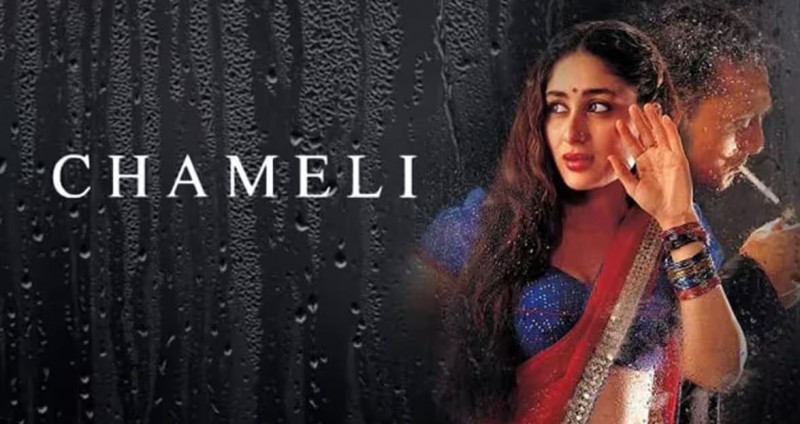
In the world of Indian film, controversy has frequently been a double-edged sword. A movie's buzz and intrigue can be increased by this, but it can also spark discussions and debates that go beyond the confines of the movie theatre. Sudhir Mishra's 2004 film "Chameli," which is one of these contentious gems, is one such example. Due to its intense scenes, excessive smoking, and alcohol consumption, this film, which stars Rahul Bose and Kareena Kapoor in key roles, has caused a storm of controversy. In addition, there were questions regarding whether the movie unintentionally encouraged smoking due to its frequent use of tobacco. In this article, we will delve deeply into these controversies and examine how they affected how people viewed the movie and the broader public conversation.
The central theme of the novel "Chameli" is the fateful union of two seemingly disparate characters. An experienced investment banker named Aarav (Rahul Bose) gets lost one rainy night while wandering Mumbai's busy streets. Here he meets Chameli, a sassy and streetwise sex worker played by Kareena Kapoor. These two people, who come from very different backgrounds, spend a memorable night together as the movie progresses, sharing their experiences, hopes, and vulnerabilities.
"Chameli," written by Sudhir Mishra, who is renowned for his talent for creating realistic narratives, features his distinctive style. Unapologetically delving into Mumbai's seedy red-light district, the movie sheds light on the lives of sex workers. It was inevitable that this realistic portrayal would unnerve viewers, and it certainly did. The intense scenes of the movie defied the expectations of Indian cinema by addressing social issues, displaying raw emotions, and making sexual references.
Chameli as portrayed by Kareena Kapoor was praised for its emotional nuance and sincerity. She perfectly captured the persona, giving her a more authentic appearance than the stereotypical portrayal of a sex worker frequently seen in Bollywood. The portrayal of Aarav by Rahul Bose contributed to the film's realism by displaying a character who is profoundly impacted by the harsh realities he encounters.
The excessive drinking and smoking that was portrayed in "Chameli" was one of the main topics of controversy. Aarav, played by Rahul Bose, was depicted as a heavy smoker, while Chameli, played by Kareena Kapoor, was frequently seen drinking. The portrayal of smoking in the movie, according to critics and public health advocates, was glamorised and might unintentionally encourage young people to smoke.
On the other hand, those who supported the movie argued that drinking and smoking were necessary for the characters to grow and for the story to be authentic. It was claimed that Aarav's smoking behaviour was a reflection of his inner turmoil and Chameli's alcohol use was a coping mechanism for her difficult circumstances. Aside from that, the movie did not hold back when displaying the harmful effects of these behaviours, such as health problems and regret.
It's important to realise that "Chameli" did not invent the problem of alcoholism and smoking; rather, it merely reflected the harsh realities that many people encounter in daily life. The film's detractors claimed that removing or sanitising such elements from cinema would be the same as denying that these problems exist in society.
They contended that cinema's purpose should be expanded beyond mere entertainment to include reflection and commentary on the world we live in. The movie "Chameli" did just that by shedding light on the struggles that marginalised people face, such as addiction.
Despite the controversies, or perhaps because of them, "Chameli" received favourable reviews and attracted a devoted following. A lot of people praised Kareena Kapoor's performance, which helped her gain praise and recognition for her acting versatility. A group of viewers looking for substance in Indian cinema were drawn to the movie's realistic storytelling style and willingness to tackle touchy subjects.
The controversy did have an impact on the movie's box office gross, though. Because of the explicit content, some conservative groups in society boycotted the movie, which decreased its box office earnings. Nevertheless, "Chameli" is still regarded as a significant Bollywood milestone for its audacity in tackling offbeat subjects.
Beyond its effects on the film industry, "Chameli" sparked a larger social conversation about how delicate subjects are portrayed in Indian cinema. It sparked discussions about the obligation of directors and the function of censorship in controlling content.
On the one hand, it was argued that cinema should be allowed the creative freedom to explore a variety of themes and narratives, even if they are unsettling or divisive. However, there were worries about the potential harm that such portrayals might cause to impressionable minds, especially young audiences.
"Chameli" is a great illustration of how cinema can push boundaries and spark interesting conversations. Although its intense scenes, smoking, and drinking may have caused controversy, they also contributed to the movie's impact and lasting memory. While some criticised it for possibly glamorising drinking and smoking, others praised it for being genuine and willing to address societal issues head-on.
The film "Chameli" serves as a reminder that cinema is a potent form that has the ability to both reflect and influence society. It encourages us to have in-depth discussions about the media we watch and the messages that art conveys. Whether or not they are contentious, films like "Chameli" force us to exercise critical thinking and interact with the complexities of the world.
The Nameless Character Played by Shraddha Kapoor in 'Stree'